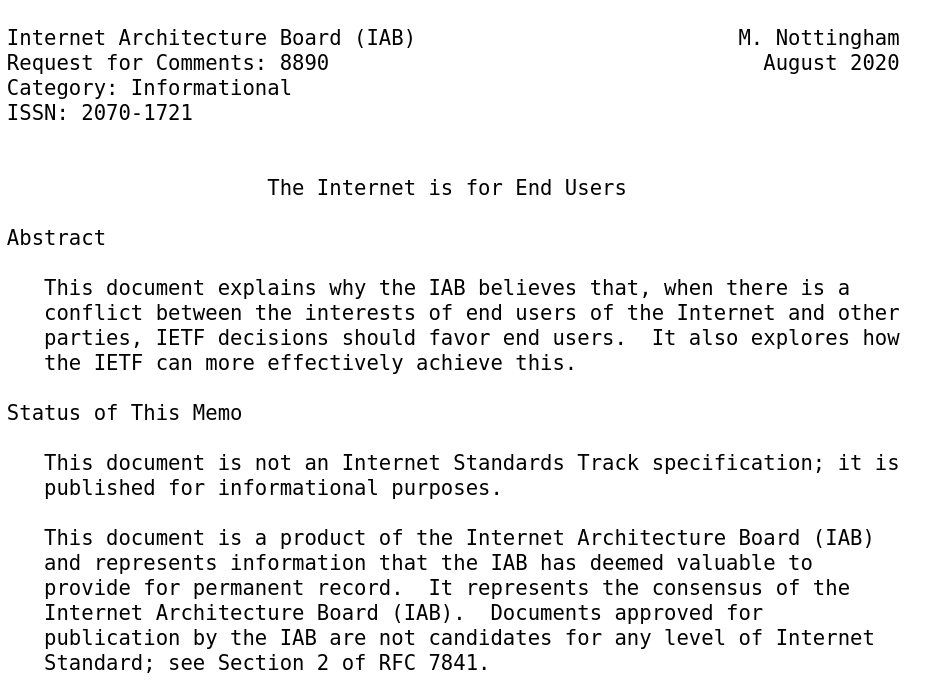One of the most profound latent political statements in internet history was the decision to make "user-agent" the technical term for a web-browser - implying that the browser should work on behalf of its user - and not on behalf of the owner of the server it connects to.
1/
1/
This implication underpins so many of the key struggles over the web& #39;s destiny: ad-blocking, stream-ripping, DRM bypassing, tracker-blocking, anonymization, etc. All of these technologies stem from the idea that a browser& #39;s first duty is to serve its user.
2/
2/
This duty surpasses any duty to rightsholders, publishers, cops, advertisers, university exam proctors or other third parties, irrespective of the legitimacy of their claims to primacy.
3/
3/
"User-agent" is a way of saying that while users can be foolish (clicking on phishing links), or wicked (posting phishing links) that trying to avert these outcomes by using the browser to control users is a cure that& #39;s worse than the disease.
4/
4/
That when you have a system that you use to communicate with your loved ones, get your education, meet with doctors, transmit trade secrets, and do your banking, it should respond to your needs above all others.
5/
5/
Naturally, this is a hotly contested proposition: there are so many entities who could solve their problems by making your browser take orders from THEM, not you.
6/
6/
This desire to control users through the browser was the source of one of the most bitter tech-policy fights I& #39;ve ever been in: EME, the fight over whether DRM should be part of the W3C& #39;s standards for web browsers.
7/
7/
This was a frankly brutal fight over the very soul of the web and the web-browser: a fight over whether the canonical browser spec would say, "The user is in charge of the browser" or "The browser is in charge of the user."
https://www.eff.org/deeplinks/2017/07/amid-unprecedented-controversy-w3c-greenlights-drm-web
8/">https://www.eff.org/deeplinks...
https://www.eff.org/deeplinks/2017/07/amid-unprecedented-controversy-w3c-greenlights-drm-web
8/">https://www.eff.org/deeplinks...
And we lost it. The W3C& #39;s reasoning was that the major browser vendors had already made that call, and the users had already lost. Better to have a standardized version of user-control than a wild west of one-off "solutions."
9/
9/
Three years later, our lives are being lived through the browser in a way that surpasses even our most dire warnings in the EME fight, and every petty tyrant is hijacking the browser to extend tendrils of control right into our homes.
10/
10/
Sometimes that& #39;s your school, spying on you and your family in the name of "invigilation":
#proctorio">https://pluralistic.net/2020/04/20/great-danes/ #proctorio
And">https://pluralistic.net/2020/04/2... sometimes it& #39;s your boss, who turned your home into a rent-free branch office and uses your browser to make it stick:
#bossware">https://pluralistic.net/2020/07/01/bossware/ #bossware
11/">https://pluralistic.net/2020/07/0...
#proctorio">https://pluralistic.net/2020/04/20/great-danes/ #proctorio
And">https://pluralistic.net/2020/04/2... sometimes it& #39;s your boss, who turned your home into a rent-free branch office and uses your browser to make it stick:
#bossware">https://pluralistic.net/2020/07/01/bossware/ #bossware
11/">https://pluralistic.net/2020/07/0...
All of this has reinvigorated the question of who the web is for: the people who run the servers, or the people who run the browsers.
12/
12/
The @IETF, another standards body, has waded into the fray, with @mnot - an internet pioneer who chairs the IETF HTTP group - weighing in with RFC 8890, AKA "The Internet is for End-Users."
https://www.rfc-editor.org/rfc/rfc8890.txt
13/">https://www.rfc-editor.org/rfc/rfc88...
https://www.rfc-editor.org/rfc/rfc8890.txt
13/">https://www.rfc-editor.org/rfc/rfc88...
Nottingham cites the browser& #39;s status as a "user-agent" as central to the Internet Architecture Board& #39;s philosophy, that end-users& #39; interests should be favored over those of other parties.
14/
14/
Nottingham has an admirably expansive view of end-users, including parents of children using the internet, people pictured in photos that traverse the internet, people being sensed by internet-connected sensors in a room they& #39;ve just entered.
15/
15/
He says that the IETF& #39;s success lies not in the mere expansion or perfection of the internet - more users, faster speeds, lower latency - but rather in whether the net empowers users, rather than controlling them.
16/
16/
To make users central to IETF work, Nottingham advises engaging with the "internet community" and points of the shortcomings and difficulties of this principle:
* Many affected users lack the technical knowledge to engage in discussions about IETF work
17/
* Many affected users lack the technical knowledge to engage in discussions about IETF work
17/
* Government representatives are imperfect proxies for the users in their jurisdictions and even worse for users in other countries
* Civil society groups - while often technically clued in and a good match for user interests - are resource constrained
18/
* Civil society groups - while often technically clued in and a good match for user interests - are resource constrained
18/
Nottingham proposes specific outreach to affected user groups whose lives might be affected by IETF work, with the IETF meeting those users where they gather, rather than requiring users to come to the IETF (in the broadest sense).
19/
19/
Nottingham acknowledges that some decisions involve tradeoffs in the wellbeing of different users groups, but cautions against using this as an excuse for failing to try to come up with positive-sum solutions.
20/
20/
The role of computer as obedient helpmeet or unblinking overseer has never been more salient, and Nottingham& #39;s intervention here is a really important, thoughtful bridging of the technical and policy implications of that fight.
eof/
eof/

 Read on Twitter
Read on Twitter


